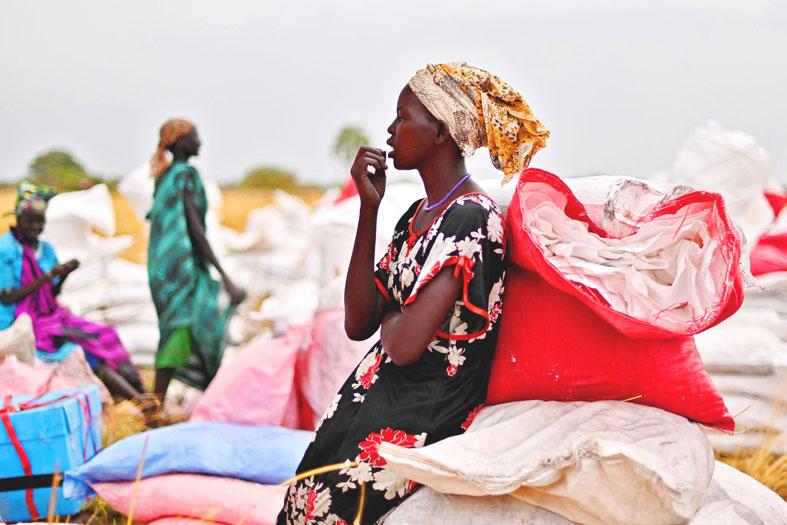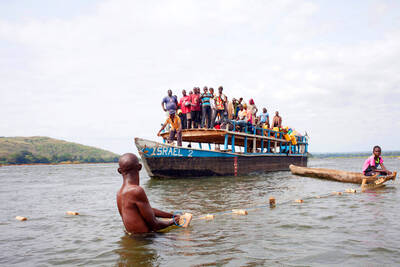The International Committee of the Red Cross (ICRC) on Wednesday warned that South Sudan is “a forgotten conflict” facing a “humanitarian crisis” made worse by the pandemic, while the UN on Thursday cautioned that 60 percent of people in the world’s newest nation are “increasingly hungry.”
South Sudan has been struggling to recover from five years of war that at least one study says killed almost 400,000 people. A coalition government formed last year between South Sudanese President Salva Kiir and opposition leader Riek Machar is implementing a peace deal behind schedule, while deadly violence continues in parts of the country.
ICRC director-general Robert Mardini, who visited South Sudan last week, called it “one of the most complex humanitarian crises anywhere.”

Photo: AFP
“Now alarmingly we see severe food shortages and a largely unquantifiable prevalence of COVID-19, which are making an already catastrophic situation even worse,” he added.
Although hostilities between the main parties might have ceased or been reduced, Mardini said that “fighting with smaller parties and splinter groups and between communities is unfortunately continuing to cause death, destruction and displacement.”
At Akabo County Hospital in eastern Jonglei state, Mardini said he saw several people recovering from gunshot wounds, including children.
They were victims of intercommunal violence that is endemic in the country and the result of historic rivalries, often over cattle and land, but sometimes over political agendas orchestrated from the capital, he said.
Other patients’ injuries were much less obvious, because they were victims of rape and sexual assault, which has soared in the conflict, and there were several children being treated for malnutrition, some for malaria at the same time, Mardini said in an online interview from Switzerland.
“These cases are just the very tip of the iceberg,” Mardini said. “Our most recent assessment shows that last year’s harvest was around half of what it was in the previous year in nine of the 10 country’s states.”
“There is little doubt that the current crisis is on the verge of slipping into something much more frightening,” he added.
UN Secretary-General Antonio Guterres told a UN Security Council meeting on conflict-driven hunger that chronic sporadic violence, extreme weather and the economic effects of COVID-19 have pushed more than 7 million people into acute food insecurity, the highest level since the country declared independence 10 years ago.
Food prices are so high “that just one plate of rice and beans costs more than 180 percent of the average daily salary — the equivalent of about US$400 here in New York,” Guterres said.
UN World Food Programme executive director David Beasley told the council he visited the country’s western Pibor county early last month and in the past few days heard that “in extreme circumstances, mothers are resorting to feeding their children with the skin of dead animals — or even mud.”
“This is a desperate situation that calls for urgent attention,” he said. “The local population call 2021 ‘the year of starvation,’ and their suffering is the result of widespread conflict, and the unprecedented floods that came in 2019 and 2020. These people are in the crossfire of conflict while bearing the brunt of the climate crisis.”

‘IN A DIFFERENT PLACE’: The envoy first visited Shanghai, where he attended a Chinese basketball playoff match, and is to meet top officials in Beijing tomorrow US Secretary of State Antony Blinken yesterday arrived in China on his second visit in a year as the US ramps up pressure on its rival over its support for Russia while also seeking to manage tensions with Beijing. The US diplomat tomorrow is to meet China’s top brass in Beijing, where he is also expected to plead for restraint as Taiwan inaugurates president-elect William Lai (賴清德), and to raise US concerns on Chinese trade practices. However, Blinken is also seeking to stabilize ties, with tensions between the world’s two largest economies easing since his previous visit in June last year. At the

UNSETTLING IMAGES: The scene took place in front of TV crews covering the Trump trial, with a CNN anchor calling it an ‘emotional and unbelievably disturbing moment’ A man who doused himself in an accelerant and set himself on fire outside the courthouse where former US president Donald Trump is on trial has died, police said yesterday. The New York City Police Department (NYPD) said the man was declared dead by staff at an area hospital. The man was in Collect Pond Park at about 1:30pm on Friday when he took out pamphlets espousing conspiracy theories, tossed them around, then doused himself in an accelerant and set himself on fire, officials and witnesses said. A large number of police officers were nearby when it happened. Some officers and bystanders rushed

Beijing is continuing to commit genocide and crimes against humanity against Uyghurs and other Muslim minorities in its western Xinjiang province, U.S. Secretary of State Antony Blinken said in a report published on Monday, ahead of his planned visit to China this week. The State Department’s annual human rights report, which documents abuses recorded all over the world during the previous calendar year, repeated language from previous years on the treatment of Muslims in Xinjiang, but the publication raises the issue ahead of delicate talks, including on the war in Ukraine and global trade, between the top U.S. diplomat and Chinese

RIVER TRAGEDY: Local fishers and residents helped rescue people after the vessel capsized, while motorbike taxis evacuated some of the injured At least 58 people going to a funeral died after their overloaded river boat capsized in the Central African Republic’s (CAR) capital, Bangui, the head of civil protection said on Saturday. “We were able to extract 58 lifeless bodies,” Thomas Djimasse told Radio Guira. “We don’t know the total number of people who are underwater. According to witnesses and videos on social media, the wooden boat was carrying more than 300 people — some standing and others perched on wooden structures — when it sank on the Mpoko River on Friday. The vessel was heading to the funeral of a village chief in